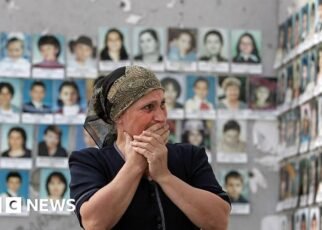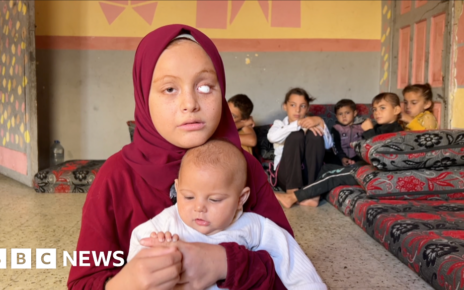[ad_1]
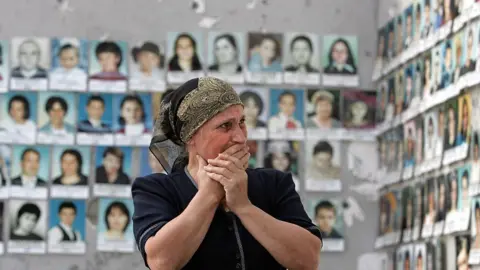 Getty Images
Getty ImagesThe day Beslan began burying its dead, there were so many cars loaded with coffins that there was gridlock on the road to the cemetery.
In the small Caucasus town, everyone had lost a relative or knew someone killed in the siege of School No. 1.
Launched by heavily armed militants, mainly from Chechnya, the terror attack lasted three days.
Three hundred and thirty-four people died; 186 of them were children.
It’s 20 years today since the siege ended suddenly in devastating explosions, but I can still hear the wailing of Beslan’s mothers; the grief that rolled over the town in waves.
I can picture the white open coffin of 11-year-old Alina, laid out in her front yard with her dolls placed carefully beside her.
And I will always remember Rima, who spent three days crammed into the stifling school gym with her grandchildren and hundreds of other hostages, bombs strung from the basketball hoops above them.
Back then, she confessed that she was ashamed to have survived.
As she and her grandchildren ran for the exit, under fire, they had to climb over the dead body of a small boy.
“God forgive us for that,” Rima begged, through streams of tears.
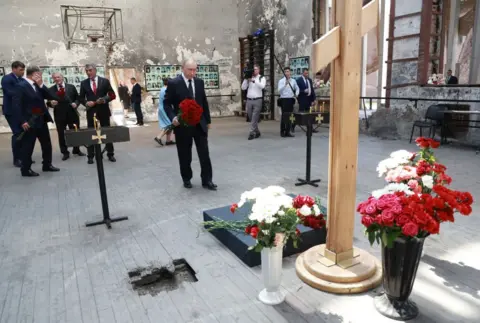 Getty Images
Getty ImagesEarly lessons in Putinism
In 2004, the suffering of Beslan was felt all over Russia and resonated all over the world.
First and foremost, the tragedy was caused by the dozens of men and women who stormed the school, firing in the air and taking hundreds of petrified people hostage.
They had rounded up mothers with babies and balloons, and little girls with big white bows in their hair. Whole families who had been celebrating the first day back to school. The militants stuffed the gym with explosives and began executing the male hostages.
That summer, Vladimir Putin’s brutal war against separatists in Chechnya – launched four years earlier – had already burst beyond the borders of the southern Russian republic.
The day before the Beslan siege, 10 people were killed when a Chechen woman blew herself up outside a Moscow metro station. Before that, suicide bombers blew two planes from the sky and there was a deadly attack on a music festival.
But for two decades now there have been persistent, troubling questions about how Mr Putin and his officials handled the attack on Beslan in their determination not to “give in” to terrorists.
Did they even try to negotiate?
Why claim the attackers made no political demands when they had called for Russian troops to pull out of Chechnya?
Could more children have been freed?
Most critically, why did rescuers fire from tanks and use flamethrowers when there were still hundreds of hostages inside the school?
To many, the siege of Beslan offered crucial early lessons in Putinism, including that he would spare nothing and no one to crush those who challenged him.
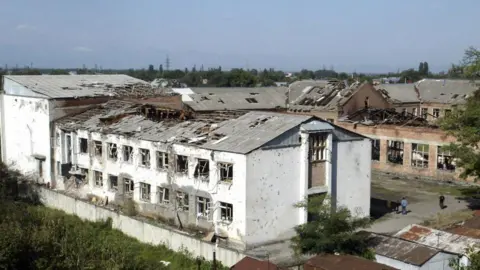 Getty Images
Getty ImagesImage protection
It took 20 years for Mr Putin to visit the ruins of School No. 1.
Even then, he didn’t join the anniversary events with the families. He only travelled there two weeks ago, alone.
A few shattered walls of the school were left standing as a memorial, eventually encased in a gold-tinted shroud and hung with framed photographs of the dead.
There, in the middle of the gym where the hostages were held, Mr Putin placed flowers beneath a wooden cross.
For most world leaders, it would be unfathomable not to have visited this spot before. It was Russia’s deadliest ever terror attack. But Mr Putin has always preferred to be filmed in a fighter jet or flanked by soldiers.
The graves of children that he couldn’t save do nothing for his action man image.
In fact, he had been to Beslan before, but barely noticed.
Right after the siege collapsed, he flew in late at night to visit a hospital under cover of darkness. He told Beslan that all Russia was mourning with them but by sunrise he was gone.
“He came far too late,” I remember hearing back then, from grieving families. “He should have stayed with us.”
But President Putin didn’t dare.
Four years earlier, a previous encounter with grieving women had scarred and scared him. When the Kursk submarine sank in 2000 it took him five days to break off his holiday and by the time he met the relatives, they tore shreds off him.
So Mr Putin began making the carefully-choreographed meeting a hallmark of his presidency. Only small, pre-vetted crowds. Everything under control.
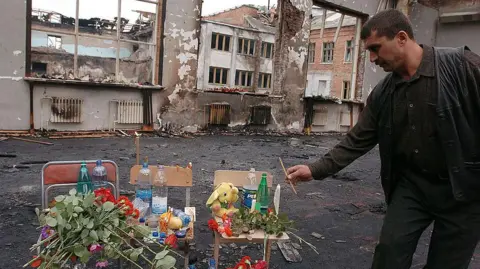 Getty Images
Getty ImagesNumbers and lies
Last month in Beslan, just three mothers were brought to meet him.
“It was an awful act of terror that took the lives of 334 people,” Mr Putin described their tragedy to them, for the sake of the state TV camera.
“Of that number, 136 were children.”
The mothers are not in vision at that moment, but they surely winced at his mistake.
Because 186 children were killed in Beslan.
It’s a number engrained on the brains of everyone in that town. It’s the one thing you don’t forget.
But Mr Putin didn’t visit Beslan to empathise. The mothers in black were just a prop.
He was using them to make a point.
Two decades ago, he reminded Russians, he had fought and won his war on terror. Now he was battling “neo-Nazis” and a hostile West in Ukraine, and he vowed he would win that war too.
Distortion and lies were already in the 2004 Putin playbook. Then, officials grossly under reported the number of hostages in Beslan.
I arrived in town on the first day of the siege and soon realised there were three times more hostages captive in that school than officials were admitting to.
Every local told us so. But state TV reporters, under instruction, continued to repeat the lie.
People feared that troops were preparing to storm the school, so the authorities were playing down the potential casualty-count.
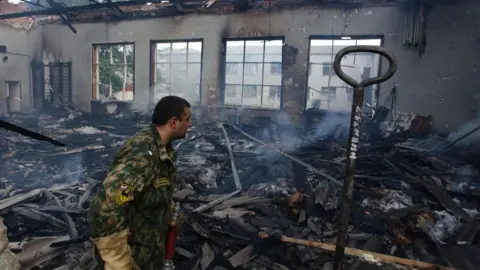 Getty Images
Getty ImagesLessons for Putin
I’ve often wondered what would happen to a government in a Western democracy after an attack that ended with many more hostages dead than terrorists.
I think it would struggle to survive the inevitable official inquiry, or the next election.
Vladimir Putin didn’t have to worry about either.
In 2017, the European Court of Human Rights ruled that Russia had failed in its duty to protect the hostages and used “indiscriminate force” as the siege collapsed. The case was brought by desperate, bereaved mothers, hunting for justice.
But there was no new investigation in Russia itself. No senior officials held to account.
When the three Beslan mothers complained to Mr Putin about that last month, at their meeting, he professed surprise and promised to look into it. He’s had 20 years.
He did address one thing, though, right after the siege.
In 2004, Mr Putin announced he was cancelling direct elections for governors in Russia’s regions, claiming that would help improve security. There was no connection whatsoever to the Beslan attack.
When parliament gathered to vote on the move, opposition politicians picketed the building warning of a creeping dictatorship.
Two decades on, there is no more opposition.
Russia’s governors are still appointed by the Kremlin. Democracy has been crushed.
The one lesson Mr Putin took from the siege of School No. 1 was one about increasing control.
[ad_2]
Source link freeslots dinogame telegram营销
